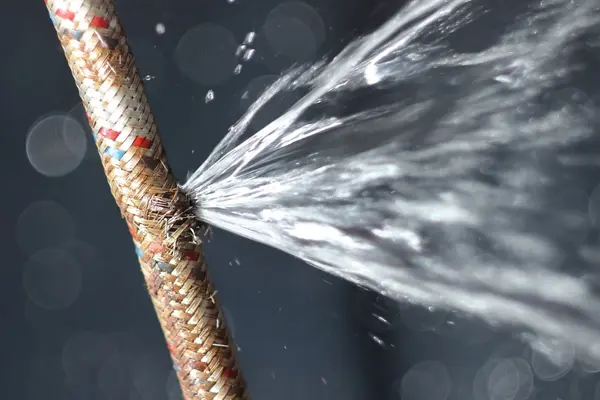Flexible Hose Connectors: Don’t Ignore Signs of Corrosion
Flexible hose connectors have become increasingly popular over the past few decades due to their convenience and ease of installation. However, beneath their seemingly harmless exterior lies a range of potential risks. It is in the best interests of all homeowners to understand the dangers associated with flexible hose connectors in plumbing, particularly the causes and consequences of corrosion. Burst flexible hoses are the leading cause of water damage to properties, they account for at least 22% of water damage claims within Australian homes; the most vulnerable areas being your kitchen and bathroom. By understanding the risks, you can take proactive measures to protect your plumbing system and avoid costly water damage to your property.

Understanding the Risks
Flexible hose connectors are commonly used in plumbing systems to connect appliances, such as faucets and toilets, to the water supply. These connectors are typically made of stainless steel or braided polymer, offering flexibility and durability. However, corrosion can compromise their integrity over time, leading to leaks, water damage, and potentially expensive repairs.
Corrosion in flexible hose connectors can occur due to various factors. One common culprit is chlorine from the water supply due to leaks which can corrode the braiding over time. Also, when household chemicals containing chlorine are stored in humid conditions such as kitchen or bathroom cabinets, the trapped chlorine fumes dissolve into hydrochloric acid under humidity, which will also corrode the stainless-steel braiding.
Recognising the Warning Signs
Detecting problems with flexible hose connectors is crucial to prevent potential water damage and plumbing emergencies. The signs of corrosion may vary, but the most common indicators include:
- Rust Spots: Rust-coloured spots or stains on any surface of the flexible connector is a clear indication it’s corroding.
- Bulging or Swelling: Corrosion on the stainless-steel braid can weaken the connector, causing it to bulge or swell.
- Water Discoloration: If you notice discoloured or rusty water coming from your faucets, it could be a sign of corrosion in the hose connectors.
- Small Leaks: Any amount of moisture leaking into the cabinets below your sink should be thoroughly investigated. This could be a sign that a flexible hose is about to burst.
These warning signs can have disastrous effects on your property if they are not remediated promptly, and of course the primary consequence: water leaks, then water damage. As the corrosion develops and weakens the connector, it will eventually crack or rupture, resulting in significant amounts of water ingress to your property. If this happens while your away from your home, the leak can cause catastrophic water damage to your property. Flexible hoses can leak up to 1,500 litres of water per hour, leading to irreversible water damage to your home and very costly repairs.
Preventing Corrosion
To mitigate the risks associated with flexible hose connectors, it is essential to take proactive measures. Here are some preventive steps you can implement:
- Regular Inspections: Conduct routine visual inspections of your plumbing system, including flexible hose connectors. Look for signs of corrosion, rust, or any visible damage. If you spot any issues, it’s crucial to address them promptly.
- Replace Old Connectors every 10 years: Even if your flexible hose connectors are not showing signs of corrosion, it is still recommended to replace them every 10 years. Selecting high-quality connectors made from corrosion-resistant materials will significantly reduce the risk of future problems.
- Monitor Water Quality: Consider installing a water filter or water treatment system to minimize the presence of chlorine and other corrosive elements in your water supply. Regularly test your water quality to identify any potential risks.
- Avoid Chemical Exposure: When cleaning your plumbing fixtures, use mild, non-abrasive cleaners and avoid harsh chemicals that can accelerate corrosion. Be cautious when storing cleaning agents near plumbing connections to prevent accidental exposure.
- Professional Installation: Ensure that flexible hose connectors are installed correctly by a licensed plumber. Proper installation helps minimize the risk of leaks and corrosion.
Flexible hose connectors offer convenience in plumbing systems, but they come with inherent risks. Corrosion, in particular, poses a significant threat, leading to leaks, water damage, and compromised functionality. By understanding the causes and consequences of corrosion, as well as implementing preventive measures, you can protect your property and avoid costly repairs. Regular inspections, investing in quality connectors, monitoring water quality, proper installation, and timely maintenance are essential steps in mitigating these risks. Stay vigilant and proactive to ensure the longevity and reliability of your flexible hose connectors.


